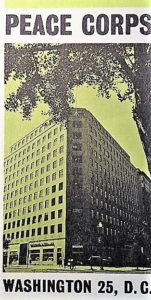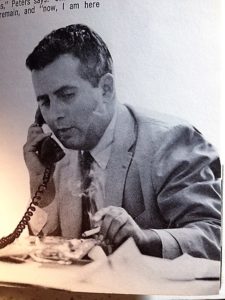Charlie Peters, First Director of Peace Corps Evaluation
 By a common rule of politics, freshmen legislators are expected to keep their mouths closed and their ears open. Carlie Peters managed to shatter the rule without rousing so much as a dirty look. The fact that he may have set a record for first-term accomplishment in the West Virginia House of Delegates is, he admits, due to at least one unusual circumstance.
By a common rule of politics, freshmen legislators are expected to keep their mouths closed and their ears open. Carlie Peters managed to shatter the rule without rousing so much as a dirty look. The fact that he may have set a record for first-term accomplishment in the West Virginia House of Delegates is, he admits, due to at least one unusual circumstance.
“I had already served two years as clerk of the House Judiciary Committee,” Peter explains. “So I knew the other Delegates—and they knew me—before I was elected. Afterward, I was in quite a different position than if I had been a perfect stranger. I was a familiar figure in the Capitol and no one thought I was trying to be a whiz kid by pushing legislation.”
In this situation, Peters went ahead—and rolled up a remarkable score. He drafted and sponsored the state’s first civil service law. He sponsored legislation setting up a Human Rights Commission to insure equal treatment regardless of race. He put through a bill controlling advertising on interstate highways.
These measures passed and are now law in West Virginia, but unqualified success fails to indicate the full measure of Peters’ energies. He pushed a number of other bills through the House of Delegates only to see them die in the State Senate.
Born and raised in Charleston, W.Va., the future legislator enlisted in the Army in 1944 and spent the next 18 months as an infantryman, an engineering trainee—and a hospital patient, after he broke his back in a training accident. Patched up, he enrolled at Columbia College where he took a B.A. in humanities and an M.A. in English, alternating his studies with several trips to Europe.
Peter received his law degree in 1957, and brought it back to Charleston where he entered his father’s firm of Peters, Merrick, Leslie and Mohler. He also brought back his bride, the former Elizabeth Hubbell of Charlottesville, whom he met while he was on the Virginia campus.
Settled again in his home town, he was quickly involved in a general law practice, jumping right into trial work with developing specialties in criminal, contract and tort litigation as well as libel law. His appointment as clerk of the House of Delegates Judiciary Committee mad him the chief staff officer of the committee. And in 1960, he was elected to the House as a Democrat from Charleston.
“I was immediately taken with the idea of the Peace Corps, and I came to work for it in April, 1961—with the idea of staying three months,” Peters says. Once aboard, he decided he wanted to remain, and “now, I am here indefinitely.”
Arriving as a consultant to the General Counsel, Peters negotiated with the government of Puerto Rico for the establishment of Camp; Crozier at Rio Abajo. Peace Corps work has since taken him to the Philippines, St. Lucia, Ghana, Nigeria, Pakistan, Thailand and Malaya—as the first field evaluator. An occasional tennis player who roots for the Cincinnati Reds in one sport and the New York Giants in another, he was named Chief of the Evaluation Division in February 1962.
Notes on Evaluation Division and Charlie Peters
In my opinion, (and the opinion of many others in the agency) no one in the Peace Corps building played a bigger role in keeping the agency on the ‘straight and narrow’ than Charlie Peters. Peters put together the first self-evaluation unit ever in the federal government. Peters filled the 11th floor of the Maiatico Building with “investigative reporters” who could write and investigate and hold the fire to the feet of Country Directors.
Hiring reporters was the idea of Bill Haddad, the Associate Director of the Office of Planning, Evaluation and Research, Charlie’s boss, and a former reporter himself. “Let’s get our own guys to go out there and find out what’s goin’ on, and if there’s something wrong, we’ll be the first to know and can correct it before the press gets onto it and starts screamin’,” said Haddad, as quoted in Coates Redmon’s Come As You Are: The Peace Corps Story, published in 1986 by Harcourt Brace Jovanovich. Later, Fritz Fischer in his book, Making Them Like Us: Peace Corps Volunteers in the 1960s, published in 1998 by the Smithsonian, would quote extensively from the evaluations done by Peters’ small army of writers, including RPCV Dick Lipez (Ethiopia 1962-64), Peggy Anderson (Togo 1962-64), Maureen Carroll (Philippines 1961-63) and Mick McGuire (Pakistan 1961-63). Peters wanted the ‘input’ of RPCVs. He also hired knowable and well known investigative journalists such as: David Gelman, Richard Rovere, Calvin Trillin, James Michener, Fletcher Knebel, Mark Harris, Philip Cook, Tim Adams, Dick Elwell, and Kevin Delany.
And Fletcher Knebel would not only do an “evaluation” of the Liberia program, he would , afterwards, and in a matter of weeks, write the novel, The Zinzin Road, based on his experiences with Peace Corps Volunteers and the agency in West Africa. Knebel dedicated this novel to PCVs, calling them “the children of Kennedy.” JC
Charlie Peters put together a unique array of professionals to assess and present the early Peace Corps experience. The the use of investigative reporters to capture the current Peace Corps field experience could be invaluable on the domestic front.
Compelling stories that feature Volunteers working collaboratlively in their host countries are one antidote to a country turning inward. As a former foundation President, I would hope that American Philanthropy might recognize the benefits of subsidizing a cadre of seasoned reporters to portray the modern day Peace Corps.
The image of idealistic Americans working closely with citizens of other countries has always been compelling. In the spirit of Charlie Peters, it would be great to mainstream awareness of the ‘on the ground’ Peace Corps reality today.
I would also suggest that RPCVs groups are doing a great job of bringing home the Peace Corps Experience. Here is a link to one: https://www.museumofthepeacecorpsexperience.org/cpages/home
Hi Richard,
These are my thoughts. Charlie Peters pioneered the internal, independent, evaluation unit in a federal agency. It was not a marketing device. What you are suggesting does sound more like a PR effort than an evaluation one. All the evaluations from the 60s are archived at the National Archive and Records Archive II at College Park, Md: Record Group 490. If those evaluations had been made public, I don’t think Peace Corps would have survived! The evaluations were brutally honest and not necessarily complimentary to staff or Volunteers in-country. Their function was to identify problems, as well as identify sucessful programs. The goal was to make Peace Corps work..
Today, the Office of the Inspector General of the Peace Corps is charged with doing program evaluations in-country. The Office has had and may still have RPCVs on staff as evaluators. This is good, but not enough. I think that Peace Corps needs a far more vigorous evaluation program. Specifically, I would like to see medical anthropologists and public health specialists evaluating each health program. I also would would like to see cultural anthropologists who specialized in specific country as well as professionals in the field of the program and country being evaluated. I think each team should include RPCVs.
Charlie Peters had left by the time I got to Peace Corps Washington. But I do remember a one on one interview in Liberia with Fletcher Knebel when he was there conducting a program evaluation. He was ensconced in a small space in the Peace Corps offices interviewing Volunteers as they happened to pass through. Some months later when THE ZINZIN ROAD was published many Volunteers were wondering if they had made the big time and were mentioned in the book. My parents eventually sent me a copy which I immediately devoured and passed around to colleagues. One would have thought it was the latest best seller. Of course it was fun trying to figure out who each of the characters was intended to be in real life; as well as the the actual places mentioned as imaginary geographic locations.
[…] Peters était le fondateur et rédacteur de longue date du Washington mensuelqu’il a lancé en 1969 après une carrière politique qui comprenait un bref passage à l’Assemblée législative de sa Virginie occidentale natale, puis un emploi dans l’administration du président John F. Kennedy. Corps de la Paix. […]